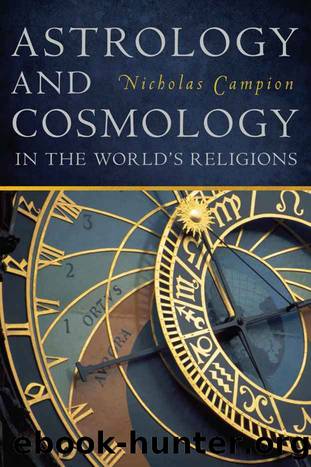Astrology and Cosmology in the World’s Religions by Nicholas Campion

Author:Nicholas Campion [Campion, Nicholas]
Language: eng
Format: mobi
Publisher: NYU Press short
Published: 2012-06-10T16:00:00+00:00
Time is the means by which God controls his creation; according to Daniel 2.21, “He changes times and seasons, he removes kings and sets up kings.” The famous verses in Ecclesiastes 3.1–8 demonstrate that there is a right time for every action. Beginning, “For everything there is a season, and a time for every matter under heaven, a time to be born, and a time to die”; the passage goes on to specify virtually every conceivable sphere of activity, although the way to determine what may or may not be an appropriate time is not specified.
The division of the land conquered by the Israelites after the Exodus into twelve sections, one for each tribe, was a means of organizing political geography as a mirror of the celestial cosmic state and is directly adapted from the Israelites’ camp outlined in Numbers, in which the twelve tribes were arranged in a square of four groups of three. The most important section, was, with the tabernacle and the “tent of meeting,” aligned toward the sunrise.15 Ezekiel converted the Hebrew camp into a sacred city, arranged as a quadrangle aligned to the cardinal points with twelve gates named after the twelve sons of Jacob (Ezekiel 48. 30–35).
The state was organized on cosmic principles embodied in space and time, but astral worship (“of the sun or the moon or any of the host of heaven”) was absolutely forbidden in Deuteronomy 17.2: The punishment for conviction on the evidence of two witnesses was stoning (17.5–7). Yet there is evidence of the veneration of celestial deities, notably Solomon’s adoration of Ashtoreth, the goddess associated with Venus (I Kings 11.5, 33). In the 6th century BCE Josiah, king of Judah, prohibited worship of the sun, moon, and stars, fair evidence that the practice was widespread (2 Kings 23:5). Such efforts, though, probably had a limited impact, and Ezekiel (8.16–17) condemned the veneration of the rising sun from the Temple:
And he brought me into the inner court of the house of the Lord; and behold, at the door of the temple of the Lord, between the porch and the altar, were about twenty-five men, with their backs to the temple of the Lord and their faces to the east, worshipping the sun.
Download
This site does not store any files on its server. We only index and link to content provided by other sites. Please contact the content providers to delete copyright contents if any and email us, we'll remove relevant links or contents immediately.
Becoming Supernatural by Dr. Joe Dispenza(7100)
Tools of Titans by Timothy Ferriss(6938)
The Witchcraft of Salem Village by Shirley Jackson(6579)
Inner Engineering: A Yogi's Guide to Joy by Sadhguru(5888)
The Four Agreements by Don Miguel Ruiz(5503)
The Power of Now: A Guide to Spiritual Enlightenment by Eckhart Tolle(4749)
The Wisdom of Sundays by Oprah Winfrey(4623)
Room 212 by Kate Stewart(4099)
Fear by Osho(4083)
Pale Blue Dot by Carl Sagan(3997)
The David Icke Guide to the Global Conspiracy (and how to end it) by David Icke(3876)
Rising Strong by Brene Brown(3777)
Animal Frequency by Melissa Alvarez(3750)
How to Change Your Mind by Michael Pollan(3669)
Sigil Witchery by Laura Tempest Zakroff(3648)
Real Magic by Dean Radin PhD(3563)
Secrets of Antigravity Propulsion: Tesla, UFOs, and Classified Aerospace Technology by Ph.D. Paul A. Laviolette(3432)
The Art of Happiness by The Dalai Lama(3378)
Man and His Symbols by Carl Gustav Jung(3310)
